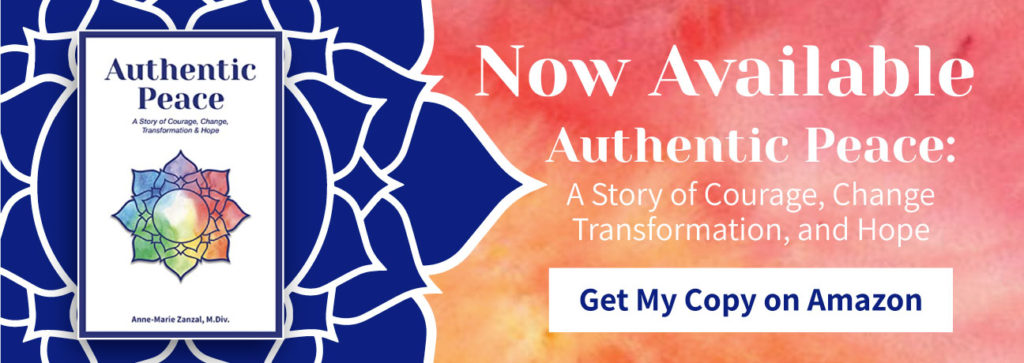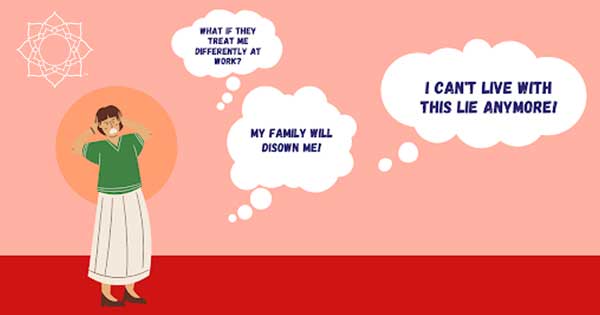Internalized Homophobia is when LGBTQIA+ people listen to negative messages about being gay – and believe them.
While society has come a long way in accepting some members of the LGBTQIA+ family, negative messages about being not straight still persist. We can also struggle with heterosexism which is a belief that straightness is the “normal” way to live. Many of us received the message that “Gay=Bad” in childhood. Negative attitudes about being gay filter in from family, friends, or church communities.
I often think of them as seeds that were planted when we were young. Sometimes the seeds take root and sprout within us. Sometimes, negative messaging is indirectly learned through commonly used taunts and insults (ever hear anyone say “That’s so gay” when describing something bad?). Negative messages about being gay may be more overt and dire depending on culture, class, and societal influence. We become conditioned with internalized homophobia to believe a certain way about what it means to be LGBTQ.
This can be frightening for those of us who suspect we are members of the queer family; we believe that if our family and friends knew the truth, we could be subjected to censure or abandonment from the very people who are supposed to love us the most. This fear of rejection can drive us further into the closet, so deep that we deny our “who we are” to ourselves.
I have found in my work that most of my clients were former excellent allies and very supportive of the LGBTQ community. I always describe internalized homophobia as “I don’t care if anyone is gay, the only person who can’t be gay is ME.” Sometimes we struggle with similar patterns of behavior like:
Denial – We notice our attraction to our own gender, but we deny or downplay it. We think that all women feel this way about other women. I am here to inform you “straight girls don’t lay awake at night wondering if they are gay.”
Secrecy – The inability to “come out” to people, even if we really want to.
Insisting others keep our secret – Creating conditions around our friendships/relationships that require people to lie about our sexual orientation to others.
Secret relationships/Double life – Spending time with same-sex partners only on certain days/times or under conditions where our identity is protected from others.
Forcing others to stay in the closet – This often affects partners in a secret relationship. Insisting that our friend or partner keeps our sexual identity a secret from certain friends or family members.
Lying by omission – Deliberately not talking to family about our romantic life. When asked, “Do you have a boyfriend?” our reply might sound something like “Oh, I don’t have time for a relationship right now; I’m so busy at work.”
Unfortunately, all of this can have repercussions on our mental health. Living with such deep feelings of fear and internalized shame result in feelings of anxiety, depression, and low self-worth. Working through these feelings with a trusted coach or therapist who understands can be enormously beneficial and help us move forward. Finding a community of empathetic people can also help move the needle forward in our self-acceptance. It is only when I joined a Facebook group of later in life lesbians did my own internalized homophobia begin to dissipate.
Brene Brown says when you douse shame with empathy it loses its power. The shame of not being straight is at the core of internalized homophobia. Showing ourselves in a caring community of like-minded individuals can do wonders for losing these feelings.
What an important step you have taken in your journey!
I know this process too well, and in my own journey, I learned that by surrounding myself with those who were facing similar struggles I had a pathway to the life I came out for. Over time, I have been able to let go of that internalized homophobia and really embrace being a lesbian.
I now provide Lotus Group Coaching and support to women coming out later in life so that this process can be easier, less lonely, and so that everyone can have a place where they get to discover who they want to be, and what it means to live authentically. If you are interested in learning more please schedule a free consultation so we can get to know each other. During this call, I can also point you in the right direction to ensure you get the support you need in your coming out journey.

I have also created a free Facebook group to bring our community together so that we can find genuine support through our own journeys. Please reach out to me and add me as a friend on Facebook and I can get you added to the group.
I also have a variety of other resources, my book called “Authentic Peace”, Two Bottle Deep Podcast, and a free guide coming out soon to help you navigate the process.






Recent Comments